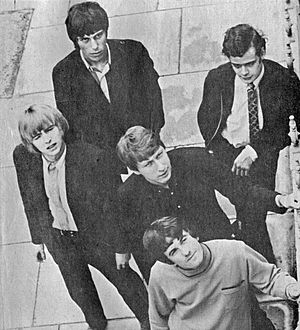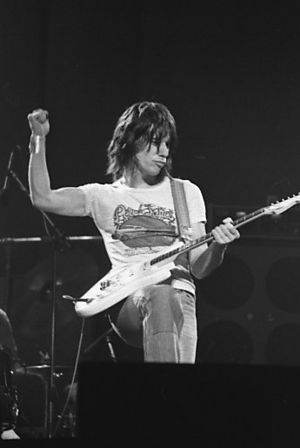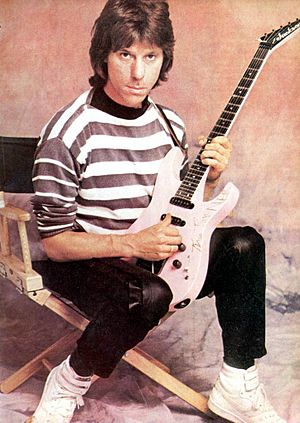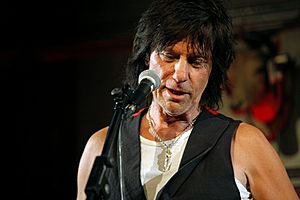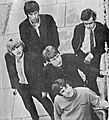Jeff Beck facts for kids
Quick facts for kids
Jeff Beck
|
|
|---|---|
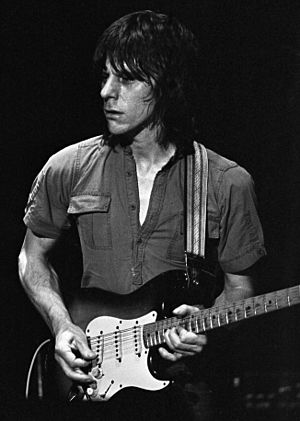
Beck in 1979
|
|
| Background information | |
| Birth name | Geoffrey Arnold Beck |
| Born | 24 June 1944 Wallington, Surrey, England |
| Died | 10 January 2023 (aged 78) East Sussex, England |
| Genres |
|
| Occupations | Musician |
| Instruments | Guitar |
| Years active | 1964–2023 |
| Labels | |
Geoffrey Arnold Beck (born 24 June 1944 – died 10 January 2023) was an English guitarist. He became famous as a member of the rock band the Yardbirds. Later, he started and led the Jeff Beck Group and Beck, Bogert & Appice.
In 1975, he began playing mostly instrumental music. This means his songs did not have singing. He focused on creating new and interesting sounds with his guitar. His music explored different styles like blues rock, hard rock, jazz fusion, and a mix of guitar-rock and electronic music.
Beck was often called a "guitarist's guitarist." This means other guitar players admired his skill. Rolling Stone magazine called him "one of the most influential lead guitarists in rock." Even though he released two popular solo albums in 1975 and 1976, he did not become as famous as some other musicians of his time. However, he recorded music with many different artists.
Beck received a lot of praise for his music. He won the Grammy Award for Best Rock Instrumental Performance six times. He also won the Best Pop Instrumental Performance once. In 2014, he received the Ivor Novello Award for his amazing contribution to British music. He was added to the Rock and Roll Hall of Fame twice. First, as a member of the Yardbirds in 1992, and then as a solo artist in 2009.
Contents
Early Life and Musical Start
I was interested in the electric guitar even before I knew the difference between electric and acoustic. The electric guitar seemed to be a totally fascinating plank of wood with knobs and switches on it. I just had to have one.
Geoffrey Arnold Beck was born on 24 June 1944 in Wallington, London. When he was ten, Jeff Beck sang in a church choir. He had a sister named Annetta. He went to Sutton Manor School and Sutton East County Secondary Modern School.
Beck said that Les Paul was the first electric guitar player who impressed him. He heard Paul playing "How High the Moon" on the radio when he was six. He asked his mother what it was. When she said it was an electric guitar and used "tricks," he knew he wanted one. Other early influences included Cliff Gallup, B. B. King, and Steve Cropper. Beck also thought Lonnie Mack was a great rock guitarist who was not given enough credit.
As a teenager, he learned to play on a borrowed guitar. He even tried to build his own guitar. He glued cigar boxes together for the body and used a fence post for the neck. He painted frets on it and used model aircraft control lines as strings.
After school, he went to Wimbledon College of Art. He then worked briefly as a painter, a golf course groundsman, and a car paint sprayer. His sister, Annetta, introduced him to Jimmy Page when they were both teenagers.
Music Career
The 1960s: Early Bands and The Yardbirds
While at Wimbledon College of Art, Beck played in several bands. In 1962, he was with Screaming Lord Sutch and the Savages. In 1963, he formed the Nightshift and played at the 100 Club. He also joined the Rumbles and the Tridents. He was a session musician for a short time, playing guitar for other artists' recordings.
In March 1965, Beck joined the Yardbirds. He took over from Eric Clapton. Jimmy Page, who was first asked to join, suggested Beck. The Yardbirds recorded most of their hit songs while Beck was with them for 20 months. He was on one full album, Roger the Engineer, released in 1966. In May 1966, Beck recorded an instrumental song called "Beck's Bolero". He was joined by Page on guitar, Keith Moon on drums, John Paul Jones on bass, and Nicky Hopkins on piano.
In June, Jimmy Page joined the Yardbirds too. At first, he played bass, then he became the second lead guitarist. This two-guitar lineup was seen in the 1966 film Blow Up, where they played "Stroll On."
Beck left the Yardbirds during a U.S. tour. He sometimes missed shows and was very particular about his music. In 1967, he recorded solo songs like "Hi Ho Silver Lining" and "Tallyman," where he also sang. Then, he formed The Jeff Beck Group. This band included Rod Stewart on vocals, Ronnie Wood on bass, Nicky Hopkins on piano, and Aynsley Dunbar (later Micky Waller) on drums.
The group released two albums: Truth (1968) and Beck-Ola (1969). Truth sold well, reaching No. 15 on the Billboard charts. Beck-Ola was also liked but less successful. The band broke up in July 1969.
In 1969, after Brian Jones died, Beck was asked to join The Rolling Stones. He also planned to form a band with bassist Tim Bogert and drummer Carmine Appice. However, Beck broke his skull in a car accident in December, so the plan was put on hold for two and a half years.
The 1970s: New Sounds and Solo Success
In 1970, after recovering, Beck formed a new band with drummer Cozy Powell. They recorded some songs in the U.S. with The Funk Brothers, but these were not released. By April 1971, Beck's new group included guitarist/vocalist Bobby Tench, keyboard player Max Middleton, and bassist Clive Chaman. This new "Jeff Beck Group" had a very different sound.
Their first album, Rough and Ready (1971), showed a mix of soul, rhythm-and-blues, and jazz. This hinted at the music Beck would play later.
Their second album, Jeff Beck Group (1972), had a strong soul influence. It included songs by American artists, including four by Stevie Wonder. Soon after this album, the band broke up.
Beck then teamed up with bassist Tim Bogert and drummer Carmine Appice. They formed the power trio Beck, Bogert & Appice. Their album Beck, Bogert & Appice was released in 1973. Critics liked their playing, but the album was not a big commercial success, except for their cover of Stevie Wonder's "Superstition." The band broke up in April 1974.
After this, Beck began recording instrumental music with producer George Martin. These sessions led to his solo album Blow by Blow (1975). This album showed Beck's amazing skill in jazz-rock. It reached number four on the music charts and was his most successful album.
He then recorded Wired (1976), which featured drummer Narada Michael Walden and keyboardist Jan Hammer. This album also had a jazz-rock fusion style. To promote it, Beck toured the world with the Jan Hammer Group. This tour resulted in the live album Jeff Beck with the Jan Hammer Group Live (1977).
In 1978, Beck toured Japan with Stanley Clarke on bass and Simon Phillips on drums. He then worked on a new studio album, There & Back, released in 1980. It included songs with Jan Hammer and Tony Hymas.
The 1980s: Collaborations and New Styles
In 1981, Beck performed with Eric Clapton at the Amnesty International benefit concerts called The Secret Policeman's Other Ball. He played on songs like "Crossroads" and "Cause We've Ended As Lovers." He also joined an all-star group for "I Shall Be Released." These performances were released on an album and film that became very popular.
In 1985, Beck released Flash. This album featured different singers, including his former bandmate Rod Stewart on "People Get Ready." This song was a hit, and its music video was played a lot on MTV.
After a four-year break, he returned to instrumental music with the 1989 album Jeff Beck's Guitar Shop. This was his first album where he played guitar using his fingers instead of a plectrum (guitar pick). Beck's recording schedule was sometimes slow because he had a long struggle with tinnitus, a ringing in the ears.
The 1990s: More Music and Hall of Fame
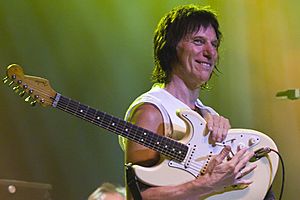
In the 1990s, Beck released more music. He played the main guitar solo on Jon Bon Jovi's song "Blaze of Glory" in 1990. He also played on Hans Zimmer's music for the film Days of Thunder. He contributed to Roger Waters' album Amused to Death (1992) and albums by Kate Bush and Beverley Craven in 1993.
He recorded the instrumental soundtrack album Frankie's House (1992). He also released Crazy Legs (1993), which was a tribute to the 1950s rockabilly group Gene Vincent and the Blue Caps.
The Yardbirds were inducted into the Rock and Roll Hall of Fame in 1992. In his speech, Beck joked, "Someone told me I should be proud tonight... But I'm not, because they kicked me out... They did!"
Beck's next album was Who Else! in 1999. This album was his first time exploring guitar-based electronic music. It was also his first time working with a female musician, Jennifer Batten, for touring, writing, and recording.
The 2000s: Grammy Wins and Collaborations
Beck won his third Grammy Award for 'Best Rock Instrumental Performance' for "Dirty Mind" from his album You Had It Coming (2000).
The song "Plan B" from his 2003 album Jeff earned him his fourth Grammy for 'Best Rock Instrumental Performance'. This showed that his new electronic-guitar style was still important. In 2003, Beck opened for B.B. King. He also performed at Eric Clapton's Crossroads Guitar Festival in 2004. In 2004, Beck played on the song ""54-46 Was My Number"" by Toots and the Maytals.
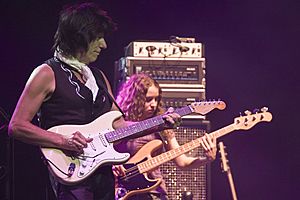
In 2007, he played with Kelly Clarkson for her cover of "Up to the Mountain" on American Idol. Later that year, he performed again at Clapton's Crossroads Guitar Festival. He played with Vinnie Colaiuta, Jason Rebello, and young bassist Tal Wilkenfeld.
Beck announced a world tour in early 2009. He played and recorded at Ronnie Scott's in London to sold-out crowds. He also played on the song "Black Cloud" on the 2009 Morrissey album Years of Refusal.
Beck was inducted into the Rock and Roll Hall of Fame as a solo artist on 4 April 2009. Jimmy Page presented the award. Beck performed "Train Kept A-Rolin'" with Page and other famous musicians like Ronnie Wood and members of Metallica. On 4 July 2009, David Gilmour joined Beck on stage at the Albert Hall. They played "Jerusalem" and ended the show with "Hi Ho Silver Lining."
The 2010s: More Awards and Tours
Beck's album, Emotion & Commotion, was released in April 2010. It had a mix of original songs and covers like "Over the Rainbow" and "Nessun Dorma." Joss Stone and Imelda May sang on some tracks. Two songs from Emotion & Commotion won Grammy Awards in 2011. "Nessun Dorma" won 'Best Pop Instrumental Performance', and "Hammerhead" won 'Best Rock Instrumental Performance'.
Beck also worked on "Imagine" for the 2010 Herbie Hancock album, The Imagine Project. He won another Grammy in 2011 for 'Best Pop Collaboration with Vocals' for this song.
In 2011, Beck received two special degrees from British universities. He was honored for his "outstanding contribution to the field of Music" by the University of the Arts London. He also received an honorary doctorate from the University of Sussex.
In 2013, Beck performed on Beach Boys founder Brian Wilson's solo album. He also toured with Wilson, Al Jardine, and David Marks in late 2013. Beck said it was a great honor to share the stage with Wilson.
In 2014, a three-track CD called Yosogai was released for his World Tour in Japan. In November 2014, he played with Joss Stone at the Festival of Remembrance. He released the album Loud Hailer in 2016.
The 2020s: Final Collaborations
On 16 April 2020, Beck released a new song with Johnny Depp. They covered John Lennon's song "Isolation." They had been recording music together for a while. Beck said they decided to release it early because of the COVID-19 pandemic lockdowns.
On 2 June 2022, Beck and Depp performed together in England after Depp won a famous court case. Their first song from their album 18, called "This Is a Song for Miss Hedy Lamarr", was announced on 10 June 2022.
Beck also played on two songs from Ozzy Osbourne's album Patient Number 9, which came out on 24 June 2022.
Guitar Style and Influence
Rolling Stone magazine called Beck "one of the most influential lead guitarists in rock." Beck said his main influences were Les Paul, the Shadows, Cliff Gallup, Ravi Shankar, Roy Buchanan, Chet Atkins, Django Reinhardt, Steve Cropper, and Lonnie Mack. He also said John McLaughlin was "the best guitarist alive" for blending Indian music with jazz and classical.
Beck helped make audio feedback and distortion popular on guitar. Before Beck, guitar sounds were often "clean, bright, and jangly." Beck's experiments with feedback, distortion, and "fuzz" sounds pushed rock music forward. He helped change the sound and role of the electric guitar in rock. His work with the Yardbirds and the Jeff Beck Group's album Truth were very important for the start of heavy metal music in the early 1970s.
One of Beck's special skills was his control of pitch. He used the whammy bar to create sounds from "nose-diving bombs to subtle, perfectly pitched harmonic melodies."
Many people, including guitarists like Jack Wilkins, see Beck as one of the greatest guitarists of his time, along with Jimi Hendrix and Eric Clapton. He was praised for his technical skill and ability to play many different styles.
In 2015, Rolling Stone magazine ranked Beck No. 5 on their list of the "100 Greatest Guitarists." Guitarist Mike Campbell praised Beck's "brilliant technique" and "personality" in his playing.
How He Played and His Gear
Beck stopped using a guitar pick regularly in the 1980s. He created many different sounds using his thumb to pluck the strings. He used his ring finger on the volume knob and his little finger on the vibrato bar of his Fender Jeff Beck Stratocaster guitar. By plucking a string and then slowly turning up the volume, he could make a unique sound that sometimes sounded like a human voice. He often used a wah-wah pedal in his live shows and recordings. Eric Clapton once said, "With Jeff, it's all in his hands."
Besides Stratocasters, Beck sometimes played Fender Telecaster and Gibson Les Paul guitars. His main amplifiers were Fender and Marshall. In his early days with the Yardbirds, Beck used a 1954 Fender Esquire guitar. He also used different fuzz pedals and echo units. He used the Pro Co RAT distortion pedal.
Personal Life and Death
From 1963 to 1967, Beck was married to Patricia Brown. In 2005, he married Sandra Cash. He did not have any children. At the time of his death, Beck lived in a historic house called Riverhall in Wadhurst, East Sussex. Beck became a vegetarian in 1969. He also supported the Folly Wildlife Rescue Trust, which helps animals. He loved classic Ford hot rod cars and often worked on them himself.
Jeff Beck died from a bacterial meningitis infection on 10 January 2023, at the age of 78.
Awards
Beck won eight Grammy Awards. His first was for 'Best Rock Instrumental Performance' for "Escape" from the album Flash in 1986.
Grammy Awards
- 1985 – Best Rock Instrumental Performance – "Escape" – (winner)
- 1989 – Best Rock Instrumental Performance – Jeff Beck's Guitar Shop with Terry Bozzio & Tony Hymas – (winner)
- 2001 – Best Rock Instrumental Performance – "Dirty Mind" – (winner)
- 2003 – Best Rock Instrumental Performance – "Plan B" – (winner)
- 2009 – Best Rock Instrumental Performance – "A Day in the Life" – (winner)
- 2010 – Best Pop Collaboration with Vocals – "Imagine" – (winner)
- 2010 – Best Pop Instrumental Performance – "Nessun Dorma" – (winner)
- 2010 – Best Rock Instrumental Performance – "Hammerhead" – (winner)
Discography
Studio Albums
- Truth (1968)
- Beck-Ola (1969) – by The Jeff Beck Group
- Rough and Ready (1971) – by The Jeff Beck Group
- Jeff Beck Group (1972) – by The Jeff Beck Group
- Blow by Blow (1975)
- Wired (1976)
- There & Back (1980)
- Flash (1985)
- Jeff Beck's Guitar Shop (1989)
- Who Else! (1999)
- You Had It Coming (2000)
- Jeff (2003)
- Emotion & Commotion (2010)
- Loud Hailer (2016)
Collaborative Albums
- Beck, Bogert & Appice (1973) – by Beck, Bogert & Appice
- Frankie's House (1992) – with Jed Leiber
- Crazy Legs (1993) – with the Big Town Playboys
- 18 (2022) – with Johnny Depp
Images for kids
-
Beck at the Enmore Theatre in Sydney, 2009
-
Beck with Tal Wilkenfeld on the 2007 Crossroads Guitar Festival tour
See also
 In Spanish: Jeff Beck para niños
In Spanish: Jeff Beck para niños
 | Stephanie Wilson |
 | Charles Bolden |
 | Ronald McNair |
 | Frederick D. Gregory |


